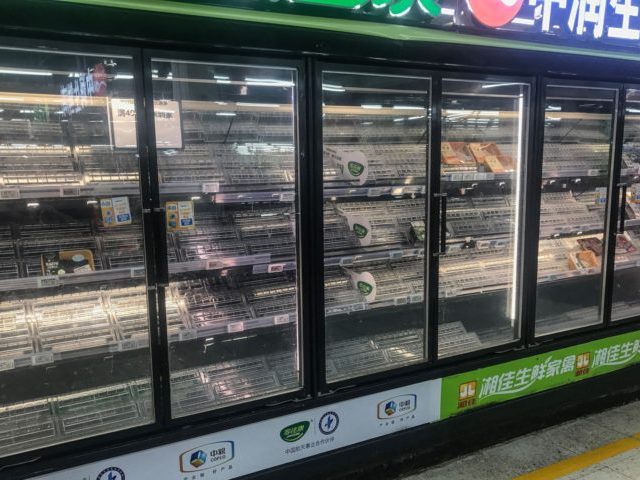China’s Ministry of Commerce on Monday evening posted a website notice advising families to “store a certain amount of daily necessities as needed to meet daily life and emergencies.”
The message also instructed local officials to create stockpiles of perishable goods and beef up their emergency distribution networks. Chinese officials hastily backpedaled from the notice after it prompted a wave of panic buying across the nation.
“As soon as this news came out, all the old people near me went crazy panic-buying in the supermarket,” one observer noted on Weibo, China’s version of banned Twitter.
Other Chinese Internet users speculated the Ministry of Commerce notice was a harbinger of some impending disaster the Chinese Communist Party (CCP) has been concealing from its subjects – food shortages caused by inclement weather, a surge of coronavirus infections, an economic meltdown, or even military action against Taiwan.
Some Chinese reasoned their government must have known the notice would touch off a panic buying spree, so it would not have posted the advisory unless the bad news it has been concealing from the public was very bad indeed.
Chinese state media fueled the sense of rising panic by alternately scolding the public for its “overactive imagination” and offering numerous conflicting explanations for why the unprecedented advisory to stockpile necessities was issued.
By Wednesday, government officials and state media had settled on explaining the alarming notice as a bit of routine bureaucracy that could have been worded better, as related by Australia’s ABC News:
The head of the [Commerce] Ministry’s department of market operation and consumption promotion, Zhu Xiaoliang, said the notice was intended to ensure stable supplies and prices of food for residents through various measures, including guiding firms in signing supply contracts, according to the Global Times.
“Judging from the current situation, the supply of daily necessities in various places is sufficient and should be fully guaranteed,” Mr Zhu said. Deputy head of the circulation and consumption institute under the ministry, Guan Lixin, said the notice was “issued based on the frequent natural disasters” which he said caused soaring vegetable prices as well as sporadic COVID-19 cases.
“[The notice] was arranged in advance. The aim is to better safeguard people’s daily necessities during this winter and next spring,” Mr Guan said.
The above-mentioned Global Times, a state-controlled newspaper, posted a string of news articles and editorials on Tuesday and Wednesday assuring readers the Commerce Ministry notice was no big deal. Taken in sum, the barrage of ostensibly reassuring state media articles seemed like shouting “Don’t panic!” into the public’s faces through a megaphone.
“There is no need to misread this message,” cooed Global Times editor-in-chief Hu Xijin.
Hu was especially eager to defuse rumors that his government told people to fill their pantries because it plans to attack Taiwan. He blamed this atmosphere of tension on the United States and the Taiwanese government because they “do not want to acknowledge the fact that the mainland is in domination step by step, and they want to continue to pump up the morale of the island and to delay the final change.”
“It is the DPP authority [Taiwan’s governing party] who is in panic all day long. They are pretending to be calm. They know that they have entered a dead end. The highly intense confrontation with the mainland is unsustainable, and their future is dim. The mainland public should not be muddled by the bluffing performances made by Taiwan and the US,” he wrote.
Hu insisted the Commerce Ministry was merely reminding Chinese citizens to take reasonable precautions against “natural disasters and the recurrence of Covid-19 [Chinese coronavirus].” He even chided citizens for not doing enough to fortify their homes because they assume the almighty and benevolent Chinese government will take care of their emergency needs.
Another Global Times article on Tuesday claimed the viral emergency notice did not “spark any of the panic buying that has been seen overseas during the onslaught of the Covid-19 pandemic,” but instead merely generated some frenzied discussion online.
This article obliquely admitted that local officials in a few cities might have made the burst of panic worse by producing their own lists of recommended “household emergency supplies” that looked suspiciously like wartime rations. These lists received a great deal of attention from Chinese social media users who worried Beijing could be preparing to attack Taiwan, leading to brisk sales of compressed biscuits.
On Wednesday, the Global Times rounded up a chorus of local officials to insist there was no sign of “panic buying” anywhere except Beijing and Shanghai, so conditions of “overall calm” are once again prevalent across most of China.
The Global Times quoted Premier Li Keqiang on Wednesday promising to “ensure supplies and stabilize the prices of meat, eggs, vegetables and other life essentials,” as well as taking steps to “ensure a warm winter and maintain stable economic operations and a steady jobs market.”
“At Huarun Wanjia Supermarket in Shanghai, a Global Times reporter saw an abundance of goods in stock. The shelves of edible oil, rice, vegetables and instant noodles were almost full, and customers were seen loading up on items in an orderly way,” the Chinese paper confidently reported.

COMMENTS
Please let us know if you're having issues with commenting.